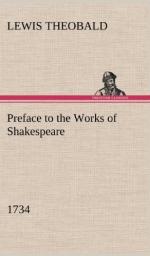Mr. Rowe has very justly observ’d, that People are fond of discovering any little personal Story of the Great Men of Antiquity: and that the common Accidents of their Lives naturally become the Subject of our critical Enquiries: That however trifling such a Curiosity at the first View may appear, yet, as for what relates to Men of Letters, the Knowledge of an Author may, perhaps, sometimes conduce to the better understanding his Works: And, indeed, this Author’s Works, from the bad Treatment he has met with from his Editors, have so long wanted a Comment, that one would zealously embrace every Method of Information, that could contribute to recover them from the Injuries with which they have so long lain o’erwhelm’d.
’Tis certain, that if we have first admir’d the Man in his Writings, his Case is so circumstanc’d, that we must naturally admire the Writings in the Man: That if we go back to take a View of his Education, and the Employment in Life which Fortune had cut out for him, we shall retain the stronger Ideas of his extensive Genius.
His Father, we are told, was a considerable Dealer in Wool; but having no fewer than ten Children, of whom our Shakespeare was the eldest, the best Education he could afford him was no better than to qualify him for his own Business and Employment. I cannot affirm with any Certainty how long his Father liv’d; but I take him to be the same Mr. John Shakespeare who was living in the Year 1599, and who then, in Honour of his Son, took out an Extract of his Family-Arms from the Herald’s Office; by which it appears, that he had been Officer and Bailiff of Stratford, and that he enjoy’d some hereditary Lands and Tenements, the Reward of his Great Grandfather’s faithful and approved Service to King Henry VII.
Be this as it will, our Shakespeare, it seems, was bred for some Time at a Free-School; the very Free-School, I presume, founded at Stratford: where, we are told, he acquired what Latin he was Master of: but, that his Father being oblig’d, thro’ Narrowness of Circumstance, to withdraw him too soon from thence, he was so unhappily prevented from making any Proficiency in the Dead Languages: A Point, that will deserve some little Discussion in the Sequel of this Dissertation.
How long he continued in his Father’s Way of Business, either as an Assistant to him, or on his own proper Account, no Notices are left to inform us: nor have I been able to learn precisely at what Period of Life he quitted his native Stratford, and began his Acquaintance with London, and the Stage.




